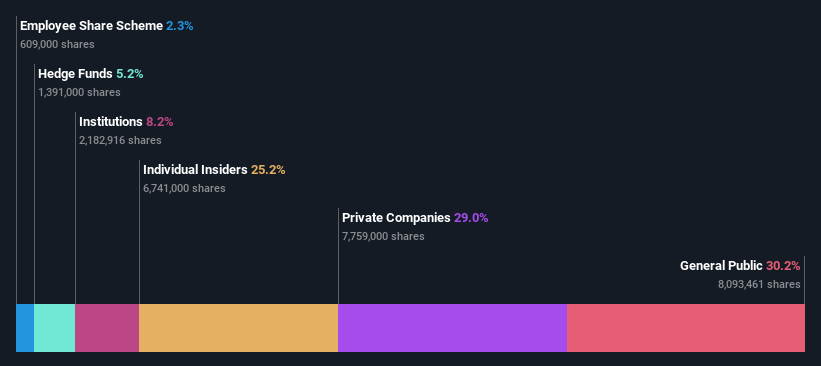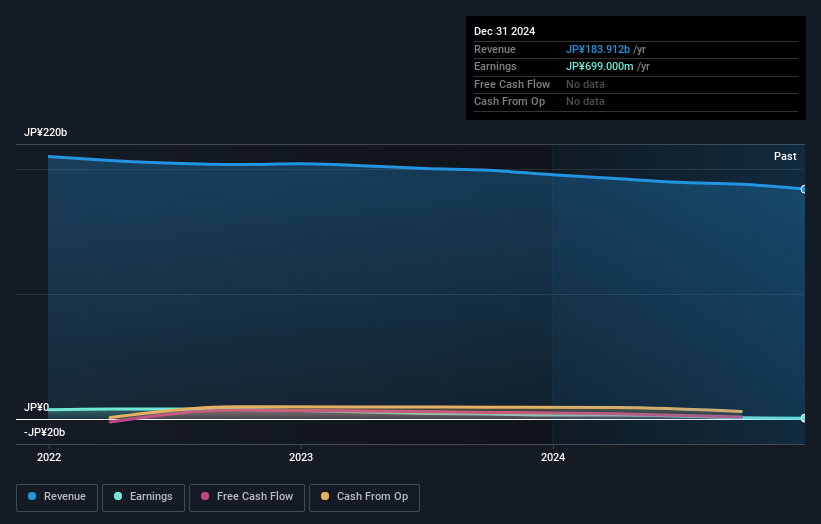- Japan
- /
- Specialty Stores
- /
- TSE:2790
Retail investors are NAFCO Co., Ltd.'s (TSE:2790) biggest owners and were hit after market cap dropped JP¥5.8b

Key Insights
- NAFCO's significant retail investors ownership suggests that the key decisions are influenced by shareholders from the larger public
- The top 7 shareholders own 53% of the company
- 25% of NAFCO is held by insiders
If you want to know who really controls NAFCO Co., Ltd. (TSE:2790), then you'll have to look at the makeup of its share registry. The group holding the most number of shares in the company, around 30% to be precise, is retail investors. In other words, the group stands to gain the most (or lose the most) from their investment into the company.
And last week, retail investors endured the biggest losses as the stock fell by 11%.
Let's delve deeper into each type of owner of NAFCO, beginning with the chart below.
View our latest analysis for NAFCO

What Does The Institutional Ownership Tell Us About NAFCO?
Institutional investors commonly compare their own returns to the returns of a commonly followed index. So they generally do consider buying larger companies that are included in the relevant benchmark index.
As you can see, institutional investors have a fair amount of stake in NAFCO. This can indicate that the company has a certain degree of credibility in the investment community. However, it is best to be wary of relying on the supposed validation that comes with institutional investors. They too, get it wrong sometimes. If multiple institutions change their view on a stock at the same time, you could see the share price drop fast. It's therefore worth looking at NAFCO's earnings history below. Of course, the future is what really matters.

It would appear that 5.2% of NAFCO shares are controlled by hedge funds. That's interesting, because hedge funds can be quite active and activist. Many look for medium term catalysts that will drive the share price higher. Fukamachi Kosan K.K. is currently the largest shareholder, with 29% of shares outstanding. Symphony Financial Partners Co., Ltd. is the second largest shareholder owning 5.2% of common stock, and Masamitsu Takano holds about 4.5% of the company stock. Masamitsu Takano, who is the third-largest shareholder, also happens to hold the title of Member of the Board of Directors. In addition, we found that Takumi Ishida, the CEO has 0.9% of the shares allocated to their name.
We also observed that the top 7 shareholders account for more than half of the share register, with a few smaller shareholders to balance the interests of the larger ones to a certain extent.
While it makes sense to study institutional ownership data for a company, it also makes sense to study analyst sentiments to know which way the wind is blowing. As far as we can tell there isn't analyst coverage of the company, so it is probably flying under the radar.
Insider Ownership Of NAFCO
While the precise definition of an insider can be subjective, almost everyone considers board members to be insiders. Management ultimately answers to the board. However, it is not uncommon for managers to be executive board members, especially if they are a founder or the CEO.
I generally consider insider ownership to be a good thing. However, on some occasions it makes it more difficult for other shareholders to hold the board accountable for decisions.
Our most recent data indicates that insiders own a reasonable proportion of NAFCO Co., Ltd.. Insiders own JP¥12b worth of shares in the JP¥47b company. We would say this shows alignment with shareholders, but it is worth noting that the company is still quite small; some insiders may have founded the business. You can click here to see if those insiders have been buying or selling.
General Public Ownership
The general public, who are usually individual investors, hold a 30% stake in NAFCO. This size of ownership, while considerable, may not be enough to change company policy if the decision is not in sync with other large shareholders.
Private Company Ownership
It seems that Private Companies own 29%, of the NAFCO stock. Private companies may be related parties. Sometimes insiders have an interest in a public company through a holding in a private company, rather than in their own capacity as an individual. While it's hard to draw any broad stroke conclusions, it is worth noting as an area for further research.
Next Steps:
I find it very interesting to look at who exactly owns a company. But to truly gain insight, we need to consider other information, too. Like risks, for instance. Every company has them, and we've spotted 3 warning signs for NAFCO (of which 1 shouldn't be ignored!) you should know about.
If you would prefer check out another company -- one with potentially superior financials -- then do not miss this free list of interesting companies, backed by strong financial data.
NB: Figures in this article are calculated using data from the last twelve months, which refer to the 12-month period ending on the last date of the month the financial statement is dated. This may not be consistent with full year annual report figures.
If you're looking to trade NAFCO, open an account with the lowest-cost platform trusted by professionals, Interactive Brokers.
With clients in over 200 countries and territories, and access to 160 markets, IBKR lets you trade stocks, options, futures, forex, bonds and funds from a single integrated account.
Enjoy no hidden fees, no account minimums, and FX conversion rates as low as 0.03%, far better than what most brokers offer.
Sponsored ContentValuation is complex, but we're here to simplify it.
Discover if NAFCO might be undervalued or overvalued with our detailed analysis, featuring fair value estimates, potential risks, dividends, insider trades, and its financial condition.
Access Free AnalysisHave feedback on this article? Concerned about the content? Get in touch with us directly. Alternatively, email editorial-team (at) simplywallst.com.
This article by Simply Wall St is general in nature. We provide commentary based on historical data and analyst forecasts only using an unbiased methodology and our articles are not intended to be financial advice. It does not constitute a recommendation to buy or sell any stock, and does not take account of your objectives, or your financial situation. We aim to bring you long-term focused analysis driven by fundamental data. Note that our analysis may not factor in the latest price-sensitive company announcements or qualitative material. Simply Wall St has no position in any stocks mentioned.
About TSE:2790
Flawless balance sheet low.
Market Insights
Community Narratives





